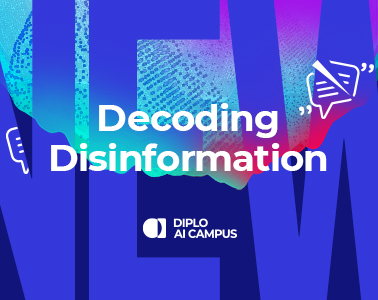This course provides a holistic understanding of challenges and potential responses related to combatting mis- and disinformation. It covers digital policy aspects that should be addressed, governance approaches, existing and emerging regional and global policy instruments, and good practices in fighting disinformation. It is aimed at government staff and other relevant stakeholders who bear the responsibility of shaping or implementing actions to fight mis- and disinformation within their organisations.
What will you learn?
- Problem definition and their interplay with other areas of digital governance. We present the main definitions that frame discussions in this area, such as information ecosystem, information pollution, disinformation, misinformation, hate speech, filter bubbles, echo chambers, information operations and astroturfing. We map the interplay between mis- and disinformation and other digital policy areas, such as cybersecurity, infrastructure, data protection, and the platform economy.
- Policies and regulatory frameworks to combat mis- and disinformation. We provide an analysis of how content policy is being introduced in order to curb societal exposure to mis- and disinformation. We also discuss how media literacy can promote individual and societal resilience by offering concrete examples based on case studies.
- Key initiatives to counter disinformation in the context of elections. We take a closer look at how disinformation is being introduced in the context of elections. We discuss how the malicious use of artificial intelligence and deep fakes could further deteriorate the informational ecosystem. Some examples of initiatives being deployed by countries and by non-government stakeholders in order to curb mis- and disinformation during electoral processes are presented.
- Practical approaches and the importance of cooperation. We analyse the delicate balance between the need to combat disinformation while upholding human rights and fundamental freedoms, especially the rights to freedom of opinion and freedom of expression. We finalise our course with some practical approaches that actors could collaboratively adopt in their strategies to mitigate mis- and disinformation.
How will you learn?
The course is based on a collaborative learning approach. You will interact intensively in discussions with classmates and lecturers from around the world. You will also receive guidance, and personalised feedback on your classwork from the course team.
Reading materials and the necessary tools for online interaction are provided in a virtual classroom, while online meetings will take place once a week on Zoom, on Fridays from 13:00 to 14:00 UTC.
Throughout each course week, participants will read course materials and discuss the weekly topic in the online classroom. During one-hour online sessions, the course faculty will explore concepts further and clarify pending questions.
Successful participants will be awarded a course certificate.
How long will you learn?
The course lasts for 5 weeks and will run from 19 November to 20 December:
- 1 week of course introduction and orientation to online learning
- 4 weeks of addressing the course topics one by one (see below for more details)
Who should apply
The course will be of interest to:
- Government staff and staff from international organisations working on topics related to online content policy, media and journalism, and education.
- Stakeholders who bear the responsibility of shaping or implementing actions to fight mis- and disinformation within their organisations.


